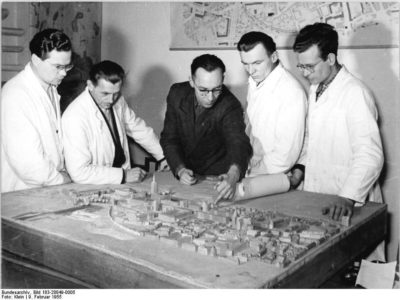Want to influence an entire skyline a la SimCity? With an Urban, Community and Regional Planning major, you can do that and more. Whether you want to protect local neighborhoods from gentrification like urbanist, writer and activist Jane Jacobs or want to bring Christopher Alexander’s influential human-centered design theories to your city, you’ll need to major in urban planning.
What you’ll be doing
Planners design every type of infrastructure around us. Urban planners can specialize in economic development, transportation, housing, urban design and environmentally-friendly planning. Students will learn about the obvious like architecture principles and land use planning, but also about topics such as applied economics, policy analysis and law. This means that whatever problem exists within a city, urban planners can attack it from any and all angles. Urban planners engineer the world itself and our impact on it.
The classes you’ll take
Urban planning majors vary somewhat between universities. You can be sure, however, that your required courses will be varied and diverse. In an introductory course you’ll study the changes urban planning theory has undergone since the 1800s due to social and economic developments. Simultaneously enroll in introductory Data Analytics class and learn about census and economic data collection and analysis. In subsequent semesters you can expect to sign up for classes about urban and regional transportation structures, urban politics in developing countries or environmental sustainability in urban areas.
Internships for this major
Because the major encompasses so much diversity, urban planning internships vary considerably depending on what area you’d like to specialize. A transportation planning internship at HNTB might have you assisting professionals designing transportation infrastructure improvements to airports or highways. But an internship in your local government’s community development department might involve work on economic development policy or community outreach. So whatever type of work you want to do with your Urban Planning degree, chances are you can connect with someone already doing it.
Career Opportunities
1. Urban Planner
As an urban planner, you’ll manage and develop of cities, towns and rural communities. Urban planners have to encourage development and growth of our communities while protecting our environment and heritage. The job involves both administrative and technical work including land use planning, community engagement and the development, administration and coordination of various planning-related projects.
2. Economic Development Analyst
Urban planning majors can also work on the development and implementation of programs that promote healthy business climates and create jobs in communities of various sizes. Work involves building relationships with local, national and international businesses and aiding in their local expansion and growth.
3. Historic Buildings Inspector
If your passion for planning centers around historic neighborhoods and the fight against gentrification, consider becoming an historic buildings inspector. This professional devises and promotes the conservation, preservation and enhancement of historic buildings. Also known as conservators, historic building inspectors help protect buildings within conservation areas and report and advise on conserving buildings according to historical, architectural or artistic value.
4. Transport Planner
Is your bus always late? Is your train too crowded? As a transport planner you can get your city moving by working on policies and projects regarding all types of transport systems at all levels of government, from international rail networks to local bike paths. Transport planners work to improve these systems or integrate them into communities without them while considering economic and environmental impacts.
5. Environmental Planning
A regular-old urban planner might go crazy with the pavement and coal plants if it weren’t for environmental planners. Environmental planners analyze the environmental impact of new construction projects. The work relies heavily on ever-changing government policy like zoning and building codes, environmental regulations and other legal issues.
Reviews
1. “I didn’t expect to get engaged on the civic angle but the more I learned about civil issues and the huge impact of things that happen every week the more I got interested. Any of the small rules that govern how we live can have a huge impact on people.” – Sarah Cutting,University of Washington Tacoma Urban Studies, Class of 2010
2. “You have to have an open mind because of how broad the major is. You can go into a lot of different fields and organizations….A lot of people care about their communities as well and they want to make a positive change. We get to help out with our community and build a network.” – Jordan Hoover, University of Washington Tacoma Urban Studies, Class of 2017
3. “Because it’s such a broad major, there’s a lot of intersectionality between fields. So if you’re interested in something like criminal justice or another field, you can reach out and connect with organizations working on that….A lot of students in the major tend to be older and are ready to make a difference.” – Maggie Gonzalez, University of Washington Tacoma Urban Studies, Class of 2017



















